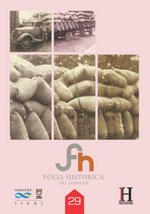The peronization of the university actors as a native category (1966-1973)
DOI:
https://doi.org/10.30972/fhn.0292434Keywords:
Peronization, University, Sixties, PeronismAbstract
If in 1955 Peronism was insignificant from the point of view of student militancy, by 1973 it concentrated a large number of activists and won elections in student centers. Consequently, it is not surprising that this transformation has been conceptualized as peronization. The fact is that beyond its analytical use in current works on the period, this is a category composed initially by the actors, who observed a growing support or insertion of university students in Peronism between 1966 and 1973. In this regard, the purpose of the article is to address the so-called peronization as a native category. That is, to attend to the points of view of the actors in their particular situation. Notions such as peronization and nationalization of university students will be located and nuanced in their context of production. This article is focused on the work of intellectual referents of the left-wing Peronism together with analyses of similar tenor on the correspondence of Juan Domingo Perón during his exile, documentation that is partially unpublished, and has been recently collected. Moreover, other primary sources are used, such as interviews, newspapers, and institutional documentation.Downloads
Published
Issue
Section
License
Se deberá adjuntar una carta, en la que se declare que "el artículo titulado XXX”, es un trabajo original, que no ha sido ni total ni parcialmente publicado en ningún medio impreso o electrónico, que no ha sido remitido simultáneamente a otra publicación y que no se encuentra actualmente en proceso de evaluación en otra publicación. En el caso que sea aceptado para su publicación, transferimos los derechos de publicación a la revista Folia Histórica del Nordeste, quien asume los derechos para editar, publicar, reproducir, distribuir copias, electrónicas o multimedia e incluir el artículo en índices nacionales e internacionales o bases de datos. Por otra parte, dejamos constancia que las afirmaciones vertidas en el mismo son de exclusiva responsabilidad de las/los autoras/es". La carta deberá estar firmada por al menos uno de los autores.






